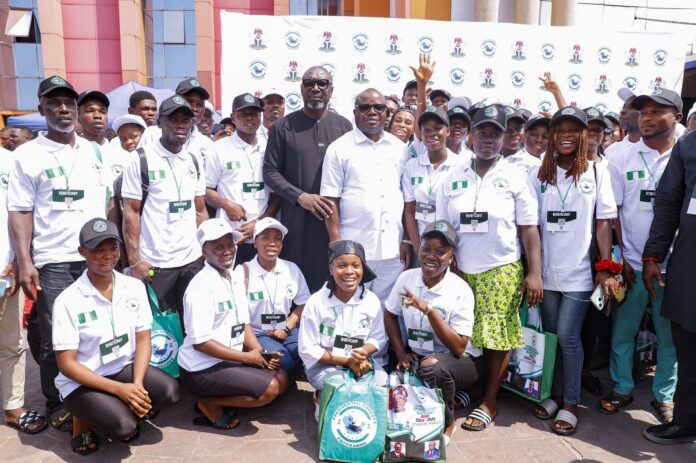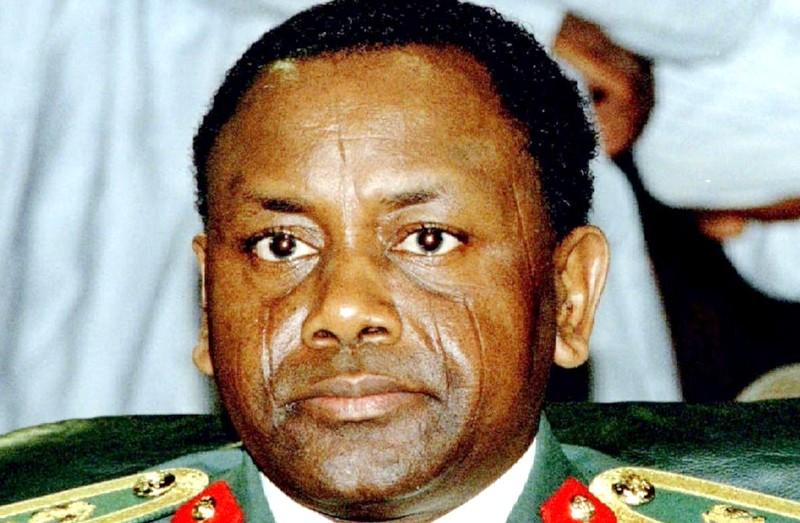News
Go For Academic Excellence, NSA, Ribadu Tells PAP Scholarship Beneficiaries

•••We Are Strengthening Human Capital Base Of Niger Delta- Otuaro
The National Security Adviser, Nuhu Ribadu, on Friday, challenged students under the Presidential Amnesty Programme scholarship scheme to be shining examples in their universities of study.
He gave the charge in Warri in his remarks at the orientation programme for 1, 700 scholarship beneficiaries deployed in various Nigerian institutions by the PAP for the 2024/2025 academic session.
Ribadu, represented by his Special Assistant on Niger Delta, Mr Goodluck Ebelo, urged the undergraduates to take full advantage of their sponsorship to acquire higher education and contribute to national growth and development after graduation.
The NSA further told the students that expectations concerning their academic journey were very high, just as he advised them to be well-behaved throughout the duration of their courses of study.
READ ALSO: Oil Theft: Otuaro Pledges PAP Support For Defence Team
He said: “With this scholarship given to you, you have a huge opportunity to excel in your studies. Please, be shining lights in your different institutions of study and the expectation is that you will be very good students of this country.”
In his keynote address, the PAP Administrator, Dr. Dennis Otuaro, noted that the deployment of the beneficiaries signified a consolidation of the Niger Delta human resources base through the scholarship scheme.
Otuaro said formal education was a critical component of the PAP’s intervention aimed at creating opportunities for the youths of the region, particularly indigent students from impacted communities, to achieve their dream of getting university education.
He said: “By sponsoring you for undergraduate studies, the PAP has taken a bold step to strategically deepen the Niger Delta formal education trajectory of bridging the human capital development gap to foster the region’s social-economic status. In fact, this is my desire and vision for our people.
READ ALSO: PAP Clears The Air On Delay In Payment Of October Stipends
“The selection process for the award of scholarship to beneficiaries for the 2024/2025 academic session was open, transparent and thorough and I take responsibility for the process. We have, as a result, deployed about 1,700 students for this academic session. My leadership would always maintain high standards and work hard to ensure everyone was fairly treated in the selection process.”
He urged the students to be peace ambassadors of the Niger Delta, focus on their studies, shun cultism and other social vices, while respecting the laws of their schools in order for them “to be found worthy in character and in learning” at graduation.
Otuaro said that President Bola Tinubu was very delighted at the incredible academic progress that PAP scholarship beneficiaries were making in the Science, Technology, Engineering and Mathematics (STEM).
He also expressed appreciation to President Tinubu and the National Security Adviser for their tremendous support for the programme, and avowed commitment to peace, human capital development, and economic growth of the region via the renewed hope agenda.
While reiterating his pledge to do his best to implement the programme’s objectives in line with Tinubu’s renewed hope agenda for the region, the PAP helmsman, again, thanked the president for giving him the opportunity to serve the people.
Earlier, the PAP’s Head of Formal Education, Dr Charles Ariye, had urged the beneficiaries to realise that the scholarship award was more than a monetary award because it represented their dedication to their personal progress, development and success.
He, therefore, encouraged them to use this opportunity to better themselves by learning from their academic mentors and also contribute to their academic communities.
In their separate goodwill messages, the Pere of Akugbene-Mein Kingdom and first Vice Chairman, Delta State Traditional Rulers Council, HRM King S. P Luke; and the Founder of Leadership, Peace and Cultural Development Initiative, Pastor Reuben Wilson, admonished the students to avoid shortcuts to academic success.
Some of the beneficiaries, including Blessing Appollos (Bayelsa State, Igbinedion University); Fyneman John-Pere (Edo State, Edwin Clark University) and Ezekiel Appeal, (Delta State, Novena University), thanked the PAP Administrator for granting them the scholarship, saying the gesture would help them a great deal in their studies.
News
PAP Sends Additional 34 Foreign Post-graduate Scholarship Beneficiaries To UK Varsities

The Presidential Amnesty Programme (PAP) has deployed an additional 34 foreign post-graduate scholarship beneficiaries to various universities in the United Kingdom for the 2025-2026 academic year.
This was contained in a statement made available to newsmen in Warri by Mr Igoniko Oduma, Special Assistant on Media to Dr. Dennis Otuaro, the Administrator, PAP.
According to the statement, the scholars’ programmes include data science, fintech analytics, cyber security, international energy law and policy, construction project management, public health, agri-food technology, electrical and petroleum engineering, among others.
The statement added that more foreign post-graduate scholars will be sent to UK universities in the current academic session.
“In December 2025, nine students, who were the first set of offshore post-graduate scholarship developments by the PAP Administrator, Dr Dennis Otuaro, for the 2024-2025 academic year, graduated from their various programmes in UK universities.
READ ALSO:PAP Scholarship Scheme Vehicle For Better Future For Niger Delta —Otuaro
“Otuaro has deployed over 9000 students to universities within and outside Nigeria for different industry-relevant programmes since he assumed office in March 2024,” the statement partly reads.
Speaking at the pre-departure orientation programme for the scholars at the PAP headquarters in Abuja, on Thursday, Otuaro said that the large-scale deployment was aimed at making the Niger Delta a knowledge-driven region.
He said that his leadership reinvigorated the programme to give it a new momentum in service delivery to the people of the region based on the mandate of President Bola Tinubu.
Otuaro said, “We are sending all of you for post-graduate studies in various universities in the United Kingdom.
“The PAP now has a new momentum and direction because of the repositioning and broad reforms that we carried out in line with the mandate of His Excellency, President Bola Ahmed Tinubu GCFR.
READ ALSO:Otuaro Tasks Media On Objective Reportage
“The objective behind the huge scholarships deployment is to ensure that we develop the needed human capital to transform the Niger Delta and generate knowledge-wealth.
“We want to develop relevant manpower in critical disciplines for our region and by extension, the country, because you are expected to contribute your quota to national development after successful graduation.”
The PAP boss, who was represented at the event by his Technical Assistant, Mr Edgar Biu, advised the scholars to study hard to achieve academic excellence in their various fields of research.
According to him, the scholars have an obligation to justify the Federal Government’s investment in their education and future.
READ ALSO:I’m Not Distracted By Anti-Niger Delta Elements, Says PAP Boss, Otuaro
He reiterated his warning that beneficiaries should not take for granted the opportunity to further their academic pursuits in the interest of the Niger Delta and indeed the country.
Otuaro expressed appreciation to President Tinubu for his “enormous interest and support for the Programme”, particularly the approval of an upward review of the programme’s budget from N65billion to N150billion.
He also expressed gratitude to the National Security Adviser, Mallam Nuhu Ribadu, for his impeccable guidance and supervision of the programme’s initiatives.
Otuaro, therefore, cautioned the scholars to obey their host country’s laws and the rules and regulations of their various institutions, stressing that they are ambassadors of Nigeria, the Niger Delta and their communities and families.
Highpoint of the orientation programme was the presentation of laptops to the scholars to help them in their studies.
News
Industrial Court Bars Resident Doctors From Strike

The National Industrial Court in Abuja has issued an interim injunction restraining the Nigerian Association of Resident Doctors (NARD) and its agents from embarking on any form of industrial action, including strikes, go-slows, picketing, or preparatory steps for protest, from Monday, January 12, 2026.
Justice E.D. Subilim ordered that the injunction remain in force pending the hearing of the motion on January 21. The suit was filed by the Attorney General of the Federation (AGF) and the Federal Government against NARD, its president, Dr Mohammad Suleiman, and Dr Shuaibu Ibrahim.
The court order comes days after resident doctors at the Usmanu Danfodiyo University Teaching Hospital (UDUTH), Sokoto, declared their full support for the nationwide strike announced by NARD over the government’s alleged failure to honour critical welfare and training agreements.
UDUTH doctors cited the non-reinstatement of five disengaged resident doctors at the Federal Teaching Hospital, Lokoja, unpaid promotion and salary arrears, and incomplete implementation of the Professional Allowance Table as key grievances. Other unresolved issues include withheld specialist allowances, delayed house officers’ salaries, postgraduate training certification delays, and deteriorating hospital infrastructure.
READ ALSO:Resident Doctors Suspend Strike, Issue Fresh Four-week Ultimatum
However, NARD had on Tuesday noted that there was no going back on the industrial action, insisting that the strike is necessary and not politically motivated. Speaking in Abuja, Dr Suleiman said the withdrawal of services from midnight on Monday is a response to “unmet commitments, shifting government positions and worsening working conditions for resident doctors, not partisan considerations.”
He argued that none of the demands outlined in the Memorandum of Understanding signed with the Federal Government on November 27, 2025, have been implemented.
“Every issue is either at the same point where it was when we signed the MoU or we have even gone backwards,” Dr Suleiman said, adding that claims by the Ministry of Health that some issues had been resolved were misleading.
He further challenged the government to show where N90 billion, allegedly allocated in the 2026 budget for health workers’ professional allowances, has been provided.
READ ALSO:Doctors’ Strike Continues As NARD Demands Fair Deal, Better Pay
The association also demanded the immediate reinstatement of the five disengaged resident doctors at FTH Lokoja with full back pay and rejected plans to redeploy them elsewhere.
Other grievances include delayed promotion arrears across 62 tertiary institutions, non-recognition of specialist certificates, and outstanding salary and allowance payments affecting nearly 40 percent of resident doctors.
While NARD remains open to dialogue and has appealed to President Bola Ahmed Tinubu for decisive intervention, it warned that unless concrete action is taken, the planned industrial action will go ahead, potentially disrupting healthcare services nationwide. Dr Mujitaba Umar, President of the UDUTH chapter, described the situation as “difficult but unavoidable,” while the chapter’s General Secretary, Dr Muhammad Abdulrahman Hassan, urged the Federal Government to act swiftly “in the interest of the Nigerian populace and the healthcare system.”
News
Nigeria To Get Fresh $9.5m Abacha Loot From UK’s Jersey

Nigeria to receive fresh $9.5 million (£7 million), believed to be stolen funds linked to former military Head of State, Sani Abacha, from the United Kingdom’s Jersey.
According to the BBC, Jersey has agreed to repatriate the fund to the Nigerian government.
The money, described as proceeds of “tainted property,” is said to be part of the vast fortune stolen by Abacha, who ruled Nigeria between 1993 and 1998.
READ ALSO:How I Transited From Abacha’s Friend To prisoner — Lamido
The funds were kept in a bank account in Jersey and had been tied up in legal proceedings for several years.
Although the assets were first recovered during the administration of former President Goodluck Jonathan, court challenges stalled their return to Nigeria. Progress was made in December 2025 when Jersey’s Attorney-General, Mark Temple, signed a memorandum of understanding, MoU, with Nigerian authorities to enable the repatriation.
The latest agreement builds on two earlier arrangements between Jersey and Nigeria that led to the return of more than $300 million (£230m) in recovered assets.

 News3 days ago
News3 days agoHow To Calculate Your Taxable Income

 Business4 days ago
Business4 days agoNNPCL Reduces Fuel Price Again

 Metro5 days ago
Metro5 days agoAAU Disowns Students Over Protest

 Metro2 days ago
Metro2 days agoEdo widow-lawyer Diabolically Blinded Over Contract Seeks Okpebholo’s Intervention

 Metro5 days ago
Metro5 days agoEdo: Suspected Kidnappers Kill Victim, Hold On To Elder Brother

 Metro3 days ago
Metro3 days agoJUST IN: Court Grants Malami, Wife, Son N500m Bail Each

 Headline3 days ago
Headline3 days agoRussia Deploys Navy To Guard Venezuelan Oil Tanker Chased By US In Atlantic

 Entertainment3 days ago
Entertainment3 days agoVIDEO: ‘Baba Oko Bournvita,’ Portable Drags His Father, Alleges Bad Parenting, Extortion

 Metro4 days ago
Metro4 days agoNine Soldiers Feared Dead In Borno IED Explosion

 Politics3 days ago
Politics3 days ago2027: Details Of PDP Leaders, Jonathan’s Meeting Emerge






























